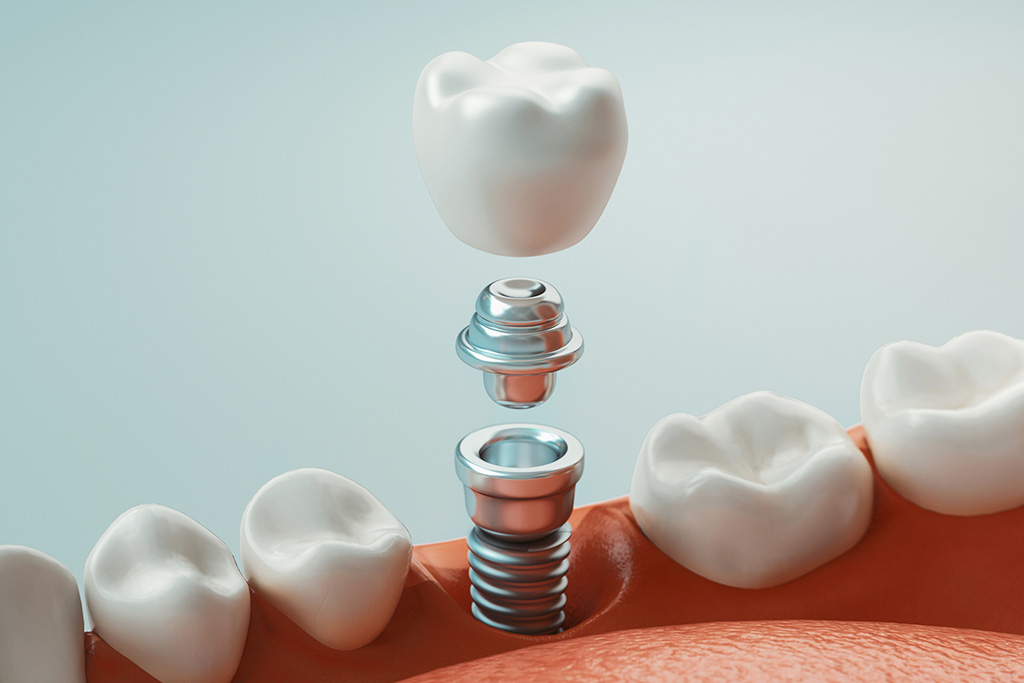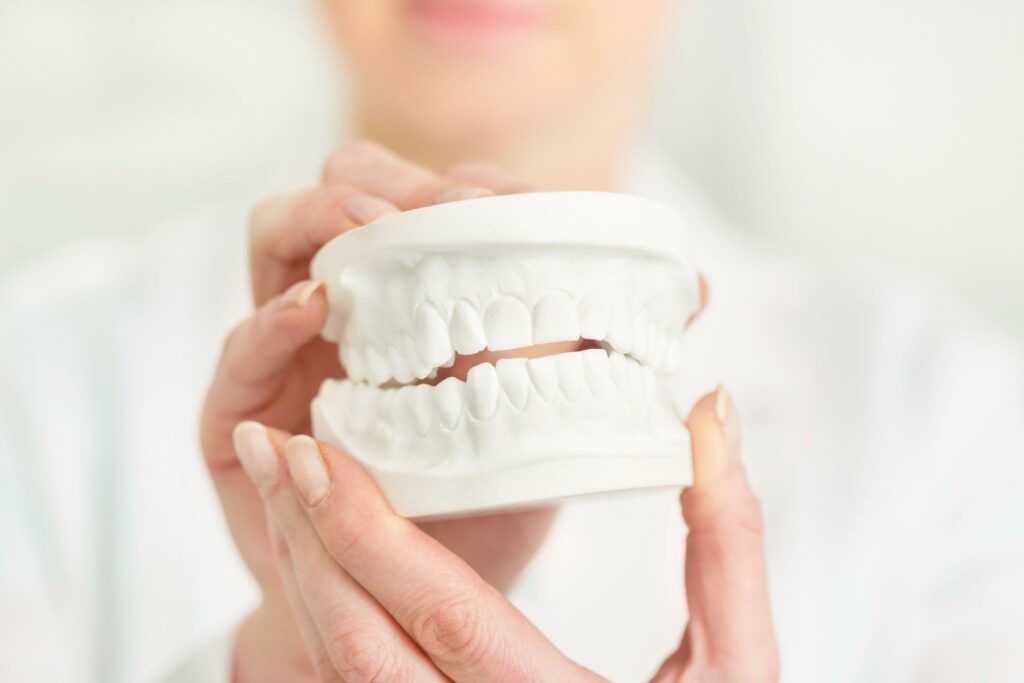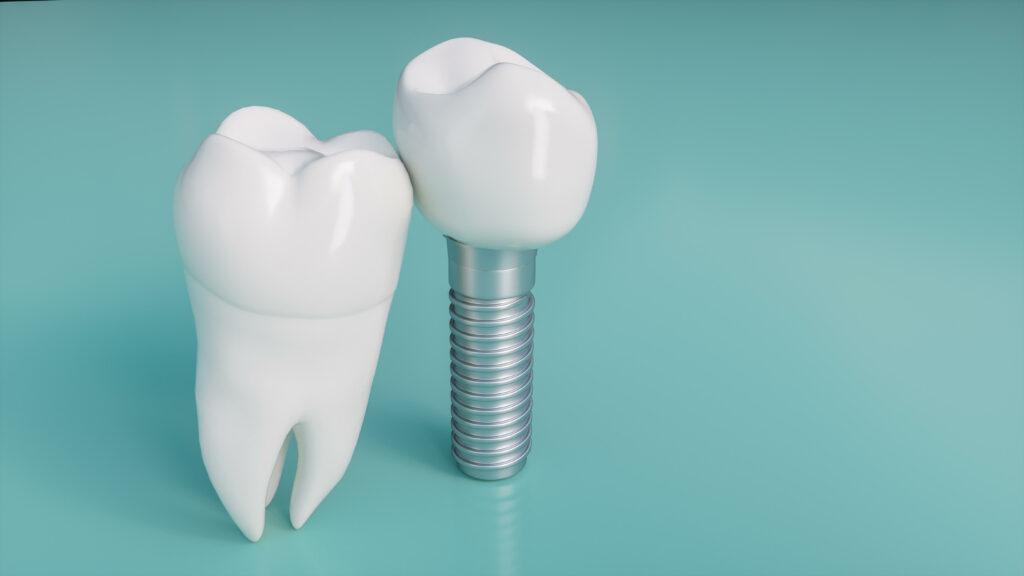
Dental Implant
What is dental implant? Any different with tooth implant?
Dental implant is a dental surgery that involves placing a titanium metal post into the jawbone to serve as the root of a prosthetic tooth. An artificial tooth crown is then attached to the implant, which is custom-designed to match the patient’s natural teeth. This procedure is used to replace missing teeth, improve chewing ability, and enhance a patient’s appearance. Dental implants offer a highly effective way to restore teeth and are often preferred over other tooth replacement options such as dentures and braces.
Dental implants serve as the foundation, while tooth implants are the visible components of the restoration. By understanding these differences, patients can make informed decisions about their dental treatment options and achieve optimal oral health and aesthetics. The terms “dental implant” and “tooth implant” are often used interchangeably, they refer to different aspects of the same tooth replacement procedure.
Dental implant process
1. Tooth Implant Evaluation
Before the implant surgery, the dental implant HK dentist will perform a comprehensive oral evaluation, including X-rays, oral scans, and dental impressions. This is to ensure that any oral or dental health issues are not overlooked, and to document the patient's dental condition.
2. Precise mold design
To ensure the accuracy of the surgery, the dental implant HK dentist will perform a computed tomography (CT) scan for each patient to ensure that the tooth implant is placed in the correct position. Also, dental implant HK dentist will also consider the patient's specific needs and bite alignment to design the most suitable treatment plan.
3. Anesthesia
Before the surgery, the tooth implant HK dentist will use local anesthesia or general anesthesia to numb the oral area and reduce the patient's pain and discomfort.
4. Implantation of the artificial implant
The dental implant HK dentist will use surgical instruments to place a titanium alloy implant into the jawbone, providing a stable foundation for the future placement of the tooth crown.
5. Waiting for healing
After the tooth implant HK surgery, the patient must wait several months for the tooth implant to heal and integrate with the jawbone.
6. Installation of the artificial tooth crown
Once the jawbone has healed, the dental implant HK dentist will take dental impressions to create an artificial tooth crown (usually made of metal or ceramic materials that closely resemble natural teeth). The crown fabrication process takes several weeks, and once completed, the tooth implant HK dentist will attach the crown to the implant. After successful attachment, the patient's appearance and chewing function will be restored to replace the missing tooth.
7. Follow-up treatment
After the tooth implant HK surgery, the dental implant HK dentist will recommend regular teeth cleaning, oral examination, and care to ensure that the dental implant can be used for a long time.
Choosing Excelsior Dental for Your Dental Implant Needs
1. Professional Doctor
2. Good Reputation
3. Reasonable and Affordable Dental Implant Cost Hong Kong
Benefits of Choosing Excelsior Dental for Dental Implants
Personalized Treatment Plans: Each patient is unique, and so are their dental needs. Excelsior Dental creates personalized treatment plans tailored to your specific requirements, ensuring optimal results.

Cutting-Edge Technology: Our dental implant HK team stay abreast of the latest advancements in dental technology. Our clinic is equipped with state-of-the-art facilities, enhancing the precision and effectiveness of your dental implant procedure.
Patient-Centric Approach: Your comfort and well-being are our tooth implant HK dentist team top priorities. Excelsior Dental adopts a patient-centric approach, offering a supportive environment throughout your dental implant journey.
Post-Procedure Care: Our tooth implant HK dentist team commitment doesn’t end with the procedure. We provide thorough tooth implant post-procedure care, guiding you through the recovery process and ensuring long-lasting of tooth implant results.
Exploring Different Types of Dental Implants

Endosteal Implants: Endosteal implants are the most common type of dental implants used today. These tooth implants are surgically placed directly into the jawbone, where they fuse with the bone over time. Endosteal implants offer excellent stability and support for dental restorations, such as crowns, bridges, or dentures. They are suitable for patients with sufficient jawbone density and volume.
Subperiosteal Implants: Subperiosteal implants are an alternative to endosteal implants, particularly for patients with inadequate bone height or density. Unlike endosteal implants, which are placed within the jawbone, subperiosteal implants sit on top of the jawbone, just beneath the gum tissue. A metal framework is placed under the gum, allowing the tooth implant to anchor securely to the jawbone. Subperiosteal implants are ideal for patients who cannot undergo bone grafting procedures.
All-on-4 Implants: All-on-4 implants offer a revolutionary solution for patients with multiple missing teeth or those who require full arch restoration. This tooth implant technique involves placing just four implants strategically in the jawbone to support a complete set of teeth (denture). All-on-4 implants provide excellent stability and functionality while minimizing the need for extensive surgery and recovery time.
Mini Dental Implants: Mini dental implants are smaller in diameter compared to traditional implants, making them an excellent option for patients with limited bone density or those seeking less invasive treatment. These tooth implants method are often used to stabilize lower dentures or replace small teeth in areas where space is limited. Mini dental implants offer a faster and more comfortable treatment option with minimal recovery time.
Choosing the Right Type of Dental Implant
Understanding the Factors That Influence Dental Implant Costs
When considering dental implants, one of the primary concerns for patients is the dental implant cost Hong Kong. The dental implant price HK or tooth implant cost Hong Kong can vary significantly based on several factors. Let’s explore the key elements that affect dental implant prices:
1. Material Choices
2. Brand and Quality of Implants
3. Number of Tooth Implants Needed
4. Additional Tooth Implant Procedures (Bone Grafting, Sinus Lift)
In some cases, patients may require additional tooth implant HK procedures before or during the implant placement process. Bone grafting may be necessary to augment insufficient jawbone volume, while a sinus lift may be needed to create adequate space for implants in the upper jaw. These supplemental procedures add to the overall treatment and tooth implant cost Hong Kong due to their surgical complexity and additional materials required.
5. Location and Reputation of the Dental Clinic
Choosing the Right Dental Implant Option
Excelsior Dental: Understanding Dental Implant Costs
When it comes to dental implants, the cost can vary significantly based on various factors, including the brand of implants chosen. Here’s a breakdown of the dental implant or tooth implant costs associated with different brands:
1. Brand Variety and Pricing
There is a wide variety of dental implant brands available, each with its own pricing structure. Generally, brands from Europe, the United States, and those with a long-standing history tend to command higher fees due to their perceived quality and reliability. Let’s take a closer look at some popular brands and their dental implant cost Hong Kong:
– Osstem (Korean Brand):
– Single Implant Cost: $18,000
– Multiple Implants: $15,000 per tooth implant
Osstem, a renowned Korean brand, offers competitive dental implant cost Hong Kong. A single Osstem implant typically costs around $18,000, with a reduced rate of $15,000 per tooth implant for multiple implants.
– Hiossen (American Brand):
– Single Implant Cost: $20,000
– Multiple Implants: $17,000 per tooth implant
Hiossen, an American brand, is another popular choice for dental implants. The tooth implant cost Hong Kong of a single Hiossen implant is approximately $20,000, while multiple implants are priced at $17,000 each.
– Straumann (Swiss Brand):
– Single Implant Cost: $25,000
– Multiple Implants: $22,000 per tooth implant
Straumann, a Swiss brand synonymous with quality, offers dental implants at a higher price point. A single Straumann implant typically tooth implant cost Hong Kong is $25,000, with a reduced rate of $22,000 per tooth implant for multiple tooth implants.
2. Considerations When Choosing a Brand
When deciding on a dental implant brand, it’s essential to consider factors beyond just the cost. While tooth implant cost Hong Kong is important, it’s equally crucial to prioritize quality, durability, and the reputation of the brand. High-quality implants may offer better long-term outcomes and lower risks of complications, ultimately providing better value for patients in the long run.
3. Personalized Treatment Plans
At Excelsior Dental, our tooth implant HK dentist team understand that every patient is unique, and their dental implant needs may vary. That’s why we offer personalized tooth implant treatment plans tailored to each individual’s requirements and budget. Our tooth implant HK dentist team will work closely with you to choose the right implant brand and treatment approach to achieve optimal results while staying within your financial means.
4. Transparent Pricing and Affordable Options
Our tooth implant HK dentist team believe in transparency when it comes to pricing, and we strive to provide our patients with clear, upfront cost estimates for their dental implant treatment. Additionally, our tooth implant HK dental offer flexible payment options and financing plans to make dental implants more affordable and accessible to everyone.
5. Expert Care and Exceptional Service
When you choose Excelsior Dental for your dental implant needs, you can trust that you’re receiving expert care and exceptional service every step of the way. Our dental implant HK dentist are committed to delivering the highest standard of care in a comfortable and welcoming environment, ensuring a positive experience for every patient.

The deficiencies of dental implants
Price
The cost of dental implants is usually higher than traditional dentures because the procedure is more complex and requires the use of high-end technology and materials. However, the overall effect of dental implants is generally better than traditional dentures.
surgical risk
Although dental implants are more effective than traditional dentures, dental implants are invasive medical procedures, while traditional dentures are non-surgical tooth restoration techniques. So dental implant surgery can cause side effects like wound infection, bleeding, pain and swelling.
Dental implant success rate
Dental implant surgery is invasive and carries risks such as infection, bleeding, pain, and swelling. While the success rate of dental implant surgery is over 90%, it may not be suitable for everyone. Patients with certain medical conditions or chronic diseases should consult with their doctor before undergoing the procedure to avoid potential risks.
long surgery
Compared to traditional denture repair procedures, dental implant surgery takes longer and requires more complex procedures. The process involves diagnosis, evaluation, computer-aided design of molds, waiting for the socket to heal, attaching crowns, and regular follow-up visits.
The sequelae caused by the risk of dental implant surgery
Dental implants are invasive medical procedures. Depending on the position of each implant, the sequelae caused are not the same, but they can be mainly divided into upper jaw implant sequelae and mandibular implant sequelae.
Sequelae of dental implants in the upper jaw Due to the close distance to the nasal cavity, if the patient has severe bone loss, it is easy to cause damage to the blood vessels, nerves or maxillary sinus membrane, leading to sinusitis and sinus perforation.
Mandibular Dental Implant Sequelae Because the nervous system of the back row of teeth is relatively complex, if the surgical angle is incorrect, it may cause nerve damage and paralysis of the corners of the mouth or gums.
Improper habits of the patient lead to sequelae Improper cleaning and maintenance of the patient after surgery may lead to inflammation at the implant site. Fractured or loose crowns.
The patient’s physical function causes sequelae People with high blood pressure, heart disease, advanced age and other chronic diseases may have the opportunity to affect the degree of healing after surgery. It is recommended to find a professional doctor for in-depth surgical evaluation before dental implant surgery, and provide the patient’s past history Medical records to reduce unnecessary risks brought about by surgery.
Addressing Common Concerns and Myths About Dental Implants
Dental implants have revolutionized modern dentistry, offering a reliable solution for replacing missing teeth. However, misconceptions and concerns often prevent individuals from considering this beneficial treatment option. Let’s debunk some common myths and address prevalent concerns about dental implants:
Myth 1: Dental implant surgery is painful and uncomfortable
Myth 2: Dental implants have a high failure rate and may not last long-term.
Fact: Dental implants boast an impressive success rate of over 90% when performed by a skilled and experienced dental professional. With proper care and maintenance, tooth implant can last a lifetime, offering unparalleled durability and functionality. Unlike traditional tooth replacement options like bridges or dentures, implants integrate with the jawbone, providing stability and preventing bone loss. Routine dental check-ups and good oral hygiene practices are essential for ensuring the long-term success of dental implants.

Myth 3: Dental implants require special maintenance and care.
Fact: One of the key benefits of dental implants is their ease of maintenance, which is similar to that of natural teeth. Regular brushing, flossing, and routine dental check-ups are essential for keeping implants clean and healthy. Additionally, patients should avoid biting down on hard objects or using their teeth as tools to prevent damage to the tooth implant restoration. While dental implants do not decay like natural teeth, proper oral hygiene practices are crucial for preventing gum disease and maintaining overall oral health.
Dental Implant Frequently Asked Questions
The cost of dental implantation depends on various factors, and the dental implant HK dentist will assess the patient’s condition to determine the surgery cost. The cost will vary for each patient, depending on factors such as the number and location of the implants, the patient’s oral health condition, and other considerations. The cost of dental implantation is generally higher than that of other dental procedures because it can effectively replace missing teeth and restore the patient’s normal way of life. It can be considered an investment in improving one’s quality of life.
Immediate implant placement is a dental implant procedure where the implant is placed into the jawbone immediately after the natural tooth extraction, without waiting for the socket to heal first. This technique is also known as immediate loading or same-day implants.
In traditional implant placement, after a tooth is extracted, a healing period of several months is required for the socket to heal and for the bone to fuse with the implant before the artificial tooth can be attached to it. However, with immediate implant placement, the implant is placed immediately after the tooth extraction, often using a specially designed implant that has a roughened surface to encourage bone growth and improve stability. This can reduce the overall treatment time and the number of office visits required for the procedure.
Immediate implant placement is a dental implant procedure where the implant is placed into the jawbone immediately after the natural tooth extraction, without waiting for the socket to heal first. This technique is also known as immediate loading or same-day implants.
In traditional implant placement, after a tooth is extracted, a healing period of several months is required for the socket to heal and for the bone to fuse with the implant before the artificial tooth can be attached to it. However, with immediate implant placement, the implant is placed immediately after the tooth extraction, often using a specially designed implant that has a roughened surface to encourage bone growth and improve stability. This can reduce the overall treatment time and the number of office visits required for the procedure.
Immediate implant placement is a suitable option for patients who have good bone density and gum health and who have healthy teeth and gums adjacent to the extraction site. However, it may not be recommended in cases where there is a significant infection or damage to the bone or soft tissue surrounding the tooth socket. It is essential to consult with a dental professional to determine if immediate implant placement is the right option for your specific case.
At Excelsior Dental, the full set of dental implant price HK can vary depending on several factors, including the number of implants required, the type of implant materials chosen, any additional procedures needed, and the complexity of the case. On average, the full set of dental implant cost Hong Kong at Excelsior Dental ranges as below:
– Osstem (Korean Brand):
– Single Implant Cost: $18,000
– Multiple Implants: $15,000 per tooth implant
Osstem, a renowned Korean brand, offers competitive dental implant cost Hong Kong. A single Osstem implant typically costs around $18,000, with a reduced rate of $15,000 per tooth implant for multiple implants.
– Hiossen (American Brand):
– Single Implant Cost: $20,000
– Multiple Implants: $17,000 per tooth implant
Hiossen, an American brand, is another popular choice for dental implants. The tooth implant cost Hong Kong of a single Hiossen implant is approximately $20,000, while multiple implants are priced at $17,000 each.
– Straumann (Swiss Brand):
– Single Implant Cost: $25,000
– Multiple Implants: $22,000 per tooth implant
Straumann, a Swiss brand synonymous with quality, offers dental implants at a higher price point. A single Straumann implant typically tooth implant cost Hong Kong is $25,000, with a reduced rate of $22,000 per tooth implant for multiple tooth implants.
During your initial consultation, our experienced dental team will assess your oral health, discuss your treatment goals, and provide you with a personalized treatment plan and cost estimate tailored to your specific needs.
Yes, Excelsior Dental understands that dental implant treatment is a significant investment in your oral health and overall well-being. To make dental implant treatment more accessible and affordable for our patients, we offer flexible financing options such as installment plans, payment arrangements, and etc. Our tooth implant HK dentist team will work closely with you to explore financing options that fits your budget. We believe that everyone deserves access to high-quality dental care, and we are committed to helping you achieve a healthy, confident smile without financial stress.



